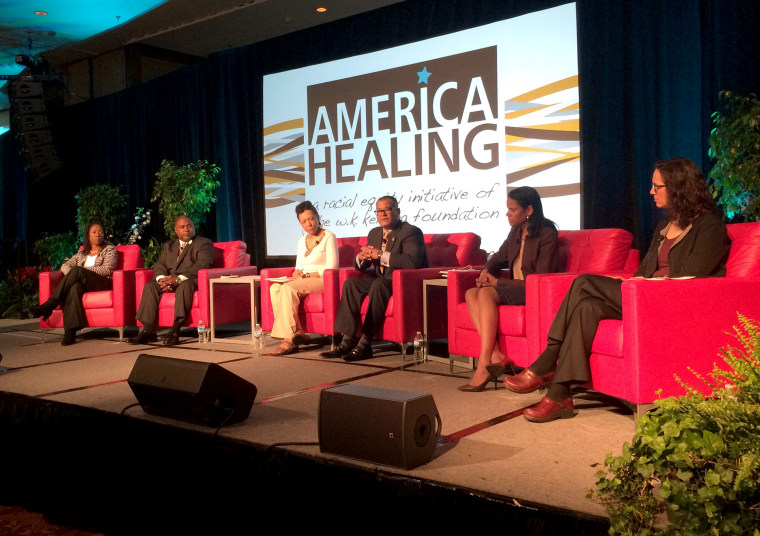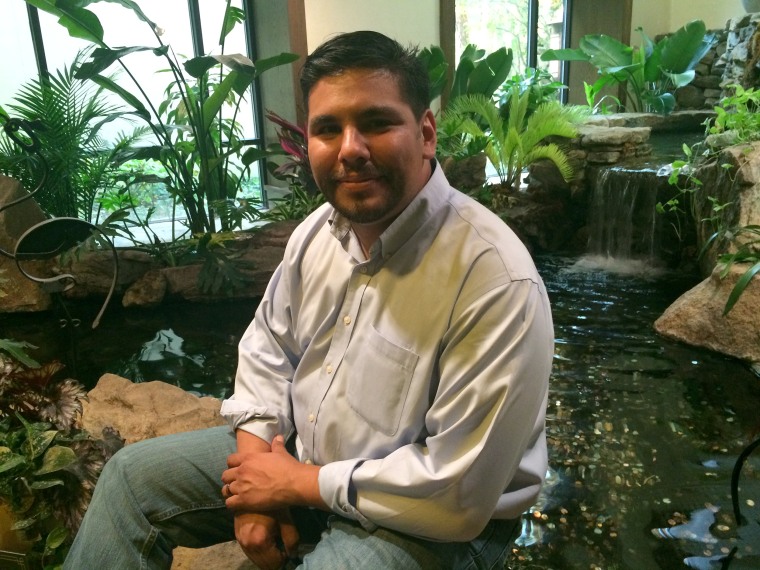ASHEVILLE, N.C. -- It’s been three decades since Nane Alejandrez helped found Barrios Unidos in Santa Cruz, California to address violence in Latino communities. It hasn’t disappeared in that time.
“The violence still exists and we have an overrepresentation of our people in the criminal justice system,” Alejandrez said.
Yet, he is among a few hundred people from around the country and of various racial backgrounds in the Blue Ridge Mountains of North Carolina for the fourth America Healing Conference organized by the W.K. Kellogg Foundation. Those gathered here regularly work in communities to address racial and economic inequities in the hope that the next generation of American children will flourish in their absence.
Alejandrez is what W.K. Kellogg Foundation’s “America Healing” project refers to as a grantee, essentially a foot soldier in a battle to correct the course of America on race and the systems of inequity on which the country was built - slavery, segregation, Jim Crow laws, racial exclusion covenants - and that still hold consequences today.

The turmoil of Baltimore and other American cities and the deaths of men of color at the hands of police hang heavy over this gathering. The unrest is a sharp contrast to the idyllic setting for this week-long conversation on racial inequity, the roots of racism and what is referred here as the persistence of a "hierarchy of humanity" based on race in American institutions and systems.
"As we watch what unfolds around us, we can see very clearly that if we don't deal with these very entrenched issues, not only will this nation have very significant issues, but children will not thrive," La June Montgomery Tabron, president and CEO of the W.K. Kellogg Foundation. "We may be fine, but as a nation, we need to heal."
Organizers say the conversations around race and the "hierarchy of humanity" don’t happen enough or don’t begin until there is an eruption of outrage as has been seen in Baltimore, Ferguson and other communities.
"Baltimore makes my work even more urgent," said Ana Perez, an Oakland, California consultant who works with government institutions and agencies to help them design their programs to consider racial disparities. "I feel I have an obligation to share what I know with as many people who are willing to hear - and those not really willing to hear it - to force change," she said.
Alejandrez works within the prison system, volunteering to bring cultural and social history to Hispanic inmates and others behind bars. He assists in helping them re-enter society after leaving and helps some prepare for their deportation journeys back to Latin American countries from which they have been gone for years.
“These are not even the Dreamers,” he said, referring to the name used for young immigrants who entered the U.S. illegally as children, often brought by parents, and have grown up in the U.S. with no legal status. “They got left out.”
Alejandrez said he gets requests from many to know more about their own cultural history as Nicaraguans, Mexicans, Mexican Americans, Salvadorans.
Author Isabel Wilkerson, whose Pulitzer Prize-winning book “The Warmth of Other Suns” charts the migration of African Americans from the South to the North and its impact on this country, said in one of the conference's meetings that new research shows children who grow up knowing their culture are more likely to excel in school.
“Knowing how one came to be and what it took to get to where you are is vital to who you are and to persevere in your own life,” Wilkerson said, commentary that struck a chord with Alejandrez and others at the conference that continues through Thursday.
Wilkerson spoke of African Americans having to flee their own country, the southern U.S., to seek “political asylum” in the north and said her book charting the historic migration of blacks from 1915 to 1970 is a story about finding freedom.
Although the migration of black people within the U.S. is its own unique story, Wilkerson said some of the same patterns from that experience are occurring today with migration from Central and South America to the U.S.
“I really prefer to believe and and see things as systemic challenges we face as human beings … The whole idea is what do humans do, not what do blacks people do … when they are faced with a particular set of obstacles,” she said. “We can all look at the story of this cautionary tale of migration, see ourselves in it and ask ourselves, what would we have done? … How would we have survived.”
A Tuesday morning panel was dedicated to the issue law enforcement and communities of color. Though there were no Latinos on the panel nor much mention of the deaths of Hispanics in police shootings such as Antonio Zambrano-Montes in Pasco, Washington, who was shot 17 times, Kellogg vice president Joseph Scantlebury said during the panel's discussion that the issue was not exclusive of other races.
"The media has presented this as a black and white issue. We know that’s not the case," said Scantlebury.
For Javier Benavidez, executive director with the SouthWest Organizing Project, the violence that has hit Baltimore in the wake of the death of Freddie Gray could have been his town of Albuquerque, where police shootings drew a Department of Justice investigation and protests. Attention to the police department's use of force came after the death of James Boyd, who was mentally challenged.
"It was a brush fire and people just couldn't get their heads around why this was happening," said Benavidez.
Like Baltimore, Albuquerque contends with its issues of inequity. The state's children rank 50th among states in child well being and many of those children are Latino. Andrea Serrano, deputy director with OLÉ (Organizers in the Land of Enchantment), has been helping families unite with owners of early childhood education and child care centers to push for more state funding for child care and early child education.
"Our Children Youth and Families Department is wait listing thousands of families who need child care assistance and yet giving back money to the state saying oh we don't need it," said Serrano.
Although she sees her organizing work as focused more around economic issues, she said she understands the interconnections between economic needs and race since many of the working families are Latinos.
"This isn't an issue that is unique to New Mexico," Serrano said. "This is something that parents are facing nationwide. Our parents are organizing and something that has become their rallying cry is 'It isn't just my kid.'"

